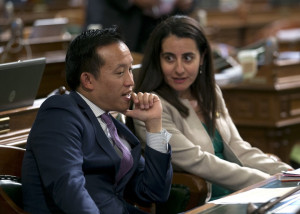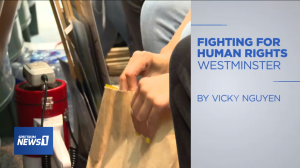SACRAMENTO — Tenants across California will for the first time have protections against how much landlords can increase their rents after legislators on Wednesday narrowly approved a measure to cap annual rent hikes.
Under Assembly Bill 1482, most yearly rent increases over the next decade will be limited to 5% plus inflation and tenants will receive protections against being evicted without cause. Gov. Gavin Newsom, who brokered the deal that led to its passage, pledged to sign the bill in a statement issued immediately after the vote. The rent caps would take effect Jan. 1.
News Item
Women of color, especially black women, are potent forces in progressive politics, both in office and as organizers who mobilize voters. It seems that liberals take this for granted, but conservatives tacitly recognize the political power of women of color when they try to discredit them through ridicule and harassment. A new report called “Ahead of the Majority,” by the AAPI Civic Engagement Fund and Groundswell Fund uses recently released census data, polling data from the 2018 midterm elections and interviews with community organizers to illuminate the political power of women of color. Their numbers are growing, and they are turning out to vote; mobilizing their families, friends and communities; and taking to the streets.
It is not easy to speak up for what you believe in, but Tracy La is willing to do whatever it takes, even if it means confronting powerful people in Orange County. “This is our lives. Our lives are on the line for something like this. We want our council members to be able to support what the community has been asking for,” said La, executive director of VietRISE.“This is our lives. Our lives are on the line for something like this. We want our council members to be able to support what the community has been asking for,” said La, executive director of VietRISE.
Picture this: you’re an unhoused person living in Los Angeles, and you’ve found a spot to bed down for the night. It’s quiet, it’s grassy, you feel somewhat safe there, even if just for the night. Then, a police officer comes to rouse you, waking you up and telling you that you’re in violation of LAMC 41.18(d) because you’re only 450 feet away from a nearby school, and not the 500 feet required by the new law.
The Trump administration announced a vast expansion of an immigration inadmissibility this week known as the “public charge.” The new rule, more than 800 pages long, creates stricter standards for applicants seeking legal permanent residency who use public benefits such as Medicaid, food stamps or housing assistance. In other words, immigration officials will look more thoroughly at the credit scores, wealth, age and educational background of immigration applicants to determine whether they are worthy of being here.
A California woman whose son needs intensive medical care says she felt "like something blew up in my face" when she learned of a Trump administration rule that would make it tougher for legal residents like her to become citizens if they access the very services her son is eligible for — such as Medicaid. Immigrants seeking to change their legal immigration status and who are enrolled in publicly funded programs such as food stamps and public health insurance could be deemed a “public charge” under the new rule starting on Oct. 15. Officials use the term to define someone who they consider may be likely to need public assistance in the future.
The ‘public charge’ rule runs counter to the whole spirit of our country.
President Trump arrives to speak at a factory in Monaca, Pa., on Tuesday. His administration announced new rules this week that would prevent immigrants who access some public benefits from becoming permanent residents. (Susan Walsh/AP)
It wasn’t that long ago that racism carried decisive political cost for Republicans. Back in 2012, Ken Cuccinelli, then the attorney general of Virginia, did an interview with a conservative show called The Morning Majority and spoke of immigrants in a manner many considered to be a comparison to vermin. “It is worse than our immigration policy,” he said of Washington, D.C.’s pest control standards. “You can’t break up rat families. Or raccoons, and all the rest, and you can’t even kill ‘em.”
No brand in California politics has ever had the staying power of Proposition 13, the 1978 tax cut that served as a primal scream from angry voters and became a symbol of their reluctance to pay more money for more government services. But four decades later, it is critics of the landmark ballot measure who are angry. Their demand to downsize Proposition 13 by excluding most commercial property from the law’s strict tax limits is all but certain to win a spot on the November 2020 ballot, an epic campaign clash that could alter California’s political landscape for years to come.
The Trump administration is moving forward with regulations that are expected to dramatically reshape the U.S. immigration system by denying green cards and visas to immigrants who use — or are expected to use — a wide range of federal, state and local government benefits, including food stamps, housing vouchers and Medicaid. The final version of the "public charge" rule, which has been a top priority for immigration hard-liners in the White House, is set to be published in the Federal Register on Wednesday.
The rule is set to take effect in 60 days but is expected to draw legal challenges from immigrant-rights groups and others.










